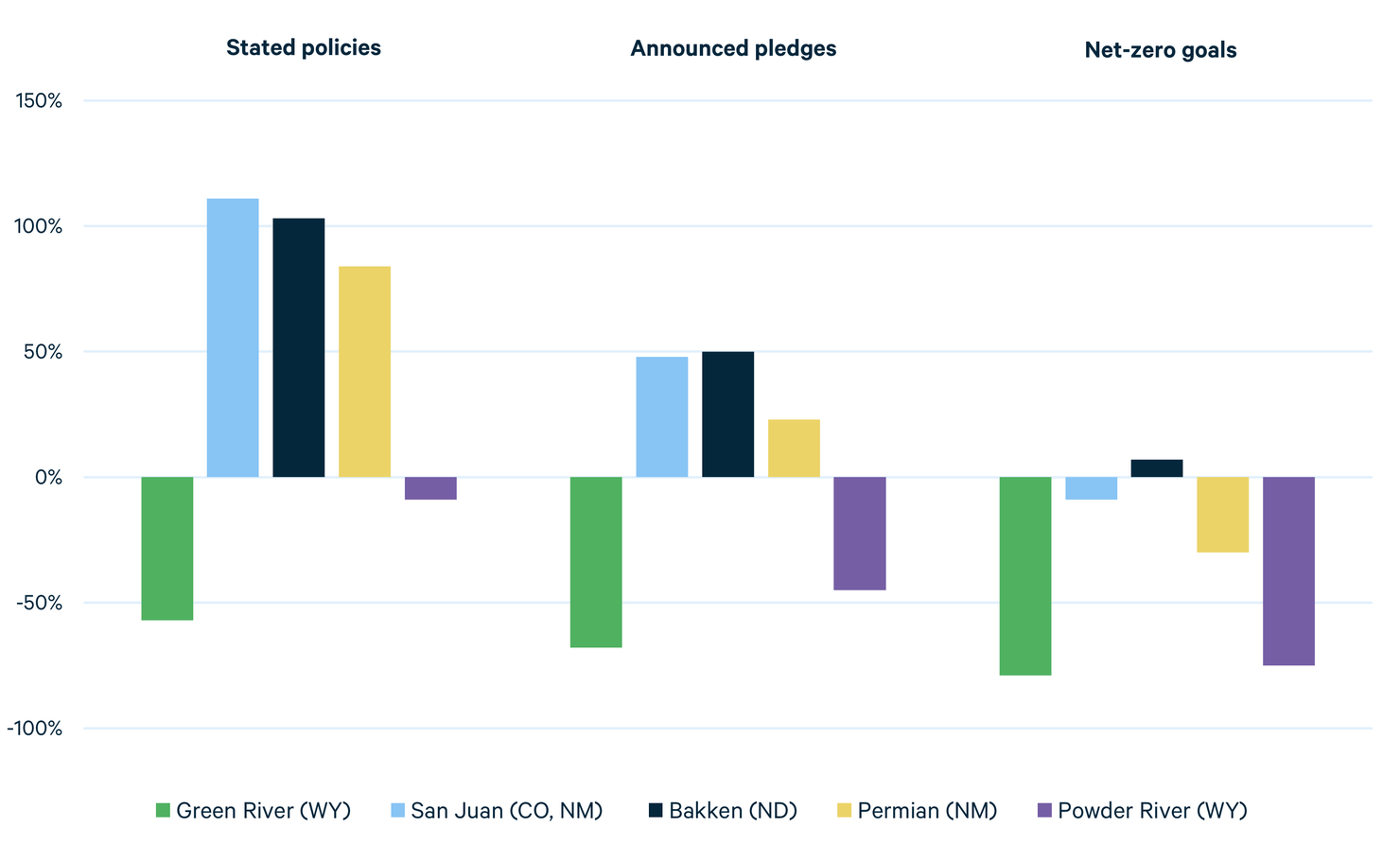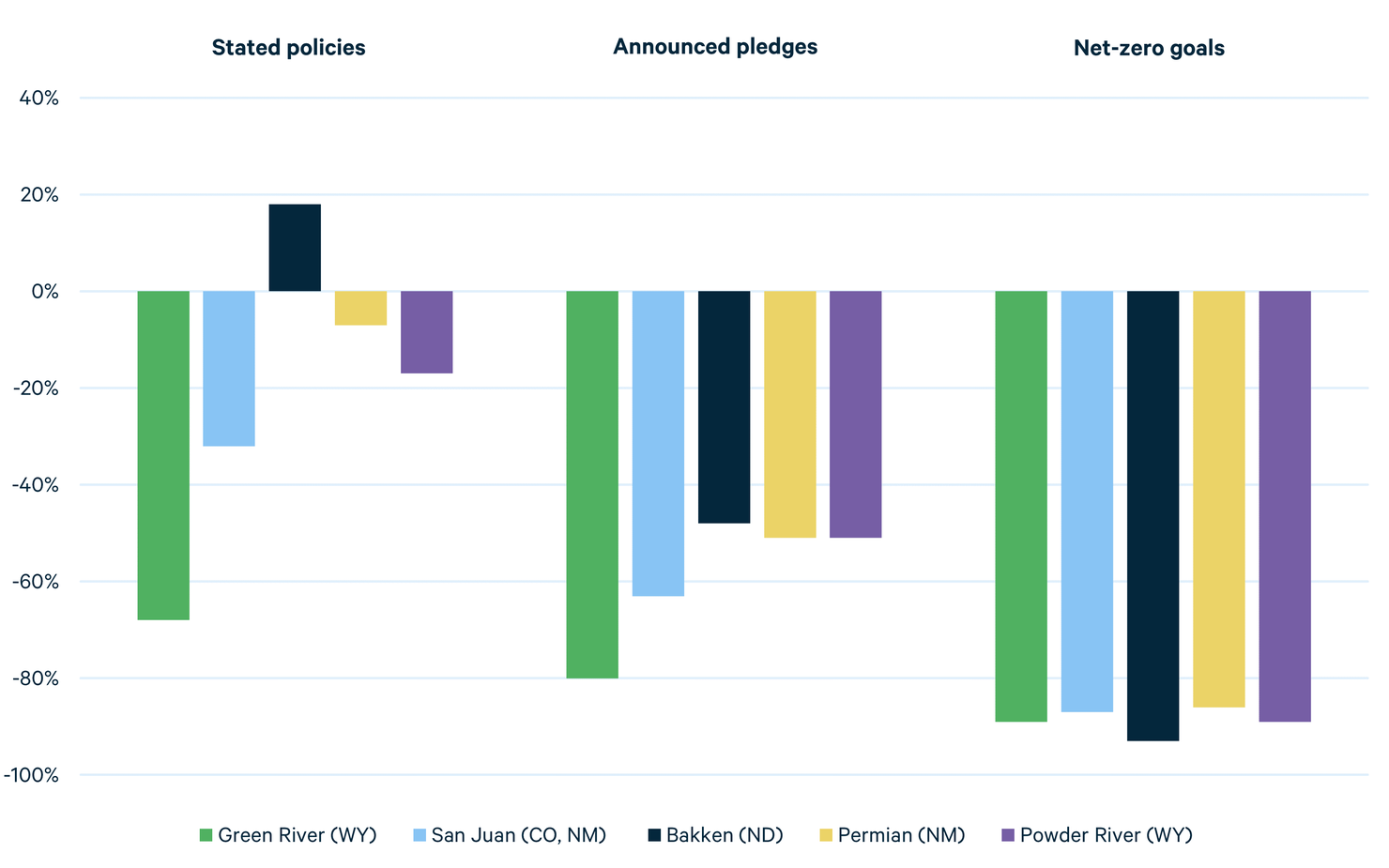Public Revenue in Oil- and Gas-Producing Regions Dependent on Fiscal, Climate Policies
New modeling from Resources for the Future reveals a mosaic of potential fiscal impacts on America’s oil- and gas-producing regions.
💡 What’s the story?
As the energy transition kicks into gear, new modeling from Resources for the Future (RFF) reveals a mosaic of potential fiscal impacts on America’s oil- and gas-producing regions.
The authors model how climate policy ambition—a major influence on demand for oil and gas—will change public revenue streams in communities that rely on oil and gas production. They find that oil- and gas-derived revenue for counties, municipalities, and school districts in regions of Wyoming, North Dakota, New Mexico, and Colorado will change to varying degrees.
For example, counties in Wyoming’s Green River Basin may stand to lose approximately 68 percent of their oil and gas revenues under current climate policies—but North Dakota’s Bakken region is projected to increase its oil and gas revenues by about 18 percent.
🔍 How do we know?
The team reached its conclusions by combining the Dynamic Oil and Gas Marketing Analysis (DOGMA) model of oil and gas production with detailed modeling of state and local financial flows reflecting fiscal policies that vary from region to region.
The authors’ projections for oil and gas production reflect price trajectories based on three climate policy scenarios developed by the International Energy Agency in its 2022 World Energy Outlook. The “stated policies” scenario comprises existing policies and policies under development; the “announced pledges” scenario encompasses pledges and policies; and the “net-zero emissions” scenario envisions a future in which the world reaches net-zero emissions by 2050.
The team applied its knowledge of existing state, local, and tribal fiscal policies and DOGMA’s production and price estimates to show how revenue could flow to local entities—namely counties, municipalities, and school districts—between 2023 and 2040 under these three energy transition scenarios.
Importantly, the estimated changes in local revenue only reflect oil- and gas-related sources such as severance taxes and property taxes on production equipment. The research does not estimate changes in other revenues or the potential for local governments to develop new revenue sources.
Author Perspective
“The energy transition isn’t a monolith. Not only will production levels vary across regions, but state and local fiscal policies will play a major role in determining which communities face the greatest challenges and which are best positioned to adapt. Every region we examine faces substantial revenue declines in a net-zero future. This means that as we seek to rapidly reduce emissions, many local governments will need support to ensure that they can continue providing essential services.”
—Daniel Raimi, Fellow and Director of RFF’s Equity in the Energy Transition Initiative
⛽ How will different regions be affected?
The graphs below show how key recipients of oil- and gas-related revenue may fare under the three modeled climate scenarios. Differences can be explained in part by current oil and gas development trends, state and local fiscal policies, and other key characteristics detailed in the paper.
Regions like the Bakken and the Permian Basin, where revenue growth is dependent on continued drilling activity, show more sensitivity to reduced oil and gas demand, whereas more mature regions like the Green River Basin are expected to decline under all scenarios.
Percentage Change in Oil- and Gas-Related Revenue by Production Basin from 2023 to 2040
Schools

Counties

Muncipalities

🏘️ How will this affect communities?
The relationship between changing production and changing revenue depends in part on the fiscal policies that communities have in place.
Long-term permanent funds in each state help provide varying degrees of revenue stability for their school districts regardless of what happens to production and prices in the future. But counties, municipalities, and other local governments are more vulnerable to volatility because their revenue streams are more directly tied to oil and gas production.
The modeling, however, reflects current fiscal policies: states, counties, municipalities, and school districts may opt to introduce reforms that pull from other sources of state funds to make up the difference.
However, even under scenarios that still reflect high oil and gas demand, regions such as the San Juan and Green River basins are likely to experience declining oil and gas production, employment, and government revenue. Future revenue streams in the Bakken, Permian, and Powder River basins are more closely tied to climate policies.
Author Perspective
“As we have seen with the decline in the coal industry, communities that are heavily dependent on a single source of development and public finance are exposed to considerable risk from an energy transition. Economic diversification can mitigate those risks, and the federal government could also step in to support local economies and public finances.”
—RFF Fellow Brian Prest
📚 Where can I learn more?
For more, read the working paper, “Assessing the Future of Oil and Gas Production and Local Government Revenue in Five Western US Basins,” by RFF Fellow Brian C. Prest, Fellow Daniel Raimi, and Research Analyst Zachary Whitlock.
Resources for the Future (RFF) is an independent, nonprofit research institution in Washington, DC. Its mission is to improve environmental, energy, and natural resource decisions through impartial economic research and policy engagement. RFF is committed to being the most widely trusted source of research insights and policy solutions leading to a healthy environment and a thriving economy.
Unless otherwise stated, the views expressed here are those of the individual authors and may differ from those of other RFF experts, its officers, or its directors. RFF does not take positions on specific legislative proposals.
For more information, please see our media resources page or contact Media Relations and Communications Specialist Annie McDarris.






